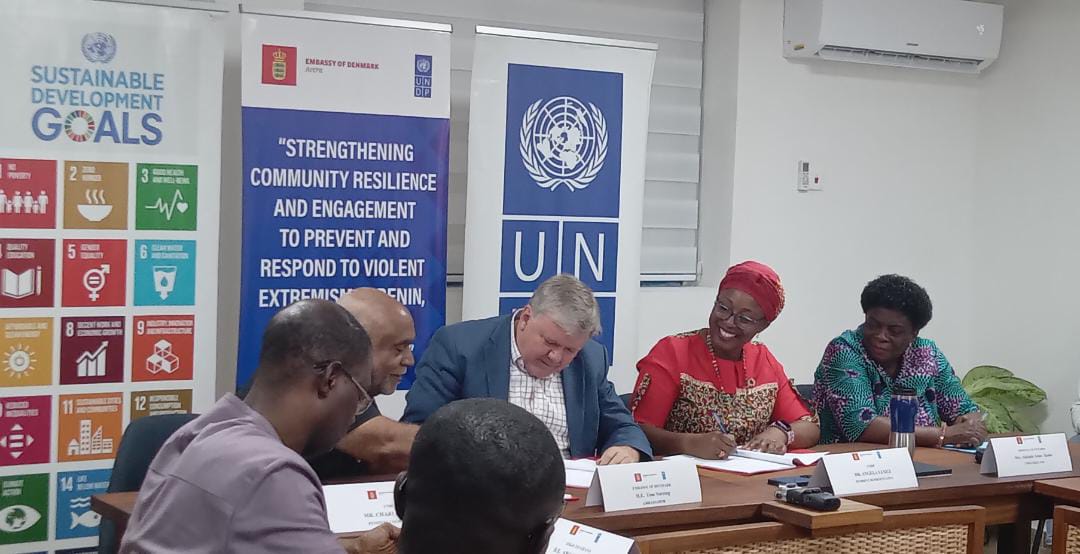The Ministry of Interior has expressed concern over the increasing number of migrants from conflict areas seeking refuge in the country.
According to the Ministry, the influx of migrants has raised security threats, particularly due to the porous nature of many land borders, making both the migrants and border residents susceptible to various risks such as human trafficking, drug smuggling, the proliferation of small arms, and terrorism.
To address these security challenges and prevent violent extremism, the United Nations Development Programme (UNDP) has partnered with the government of Denmark to launch the ‘ Atlantic Corridor project.
This project is set to take place from 2023 to 2025 and aims to strengthen community resilience and engagement in order to address the root causes of radicalization leading to violent extremism in specific target communities. The focus countries for this project are Benin, Cote d’Ivoire, Ghana, and Togo.
The Chief Director of the Ministry of Interior, Adelaide Anno-Kumi, who spoke on behalf of the sector minister during the project launch in Accra, emphasized that violent extremism not only poses security threats but also hampers economic growth.

“The prevailing economic and political stability in Ghana is attracting volumes of voluntary and forced migrants from other West African countries, especially Burkina Faso. The increasing numbers posed a security threat to us. Unfortunately, majority of our land borders are porous making them and border residents susceptible to threats such as trafficking of persons, drugs, small arms and light weapons and terrorism” she said.
“As part of bringing the citizens on board in the fight against terrorism and violent extremism, there have been a number of programmes and open fora organized in the past and on-going to sensitize Ghanaians about the importance of working with security agencies to prevent potential terrorist attacks” she added.
“Ghana, Benin, Cote d’Ivoire and Togo are neighbouring countries and have common issues related to border management and security in the cross-border areas. Activities such as terrorism, smuggling of goods, drug trafficking, human trafficking, to mention a few are usually perpetuated across our borders.
These activities continue to hinder our sustainable economic growth, development and threaten peace and security”.
Adelaide Anno-Kumi further highlighted some challenges.
“Proper management of our borders present many challenges including coordination and concerted action by administrative, diplomatic, security, intelligence, legal, regulatory and economic agencies to secure our frontiers and serve our best interests”.
“It has been established by security experts that good management of borders is extremely important for national safety. The porous nature of the cross-borders creates many issues and these issues must be appropriately addressed.
These problems are being addressed, among others, by laws and policies such as the Criminal and other Offences (Procedure) Act, 1960 (Act 30), Human Trafficking Act, 2005 (Act 694), Human Trafficking Regulation, 2015 (LI 2219), Immigration Service Act, 2016 (Act 908), National Migration Policy, 2016, Security and Intelligence Agencies Act, 1996 (Act 526), the Customs Excise and Preventive Service (Management) Law, PNDCL 330”.
The UNDP Resident Representative,Dr Angela Lusigi in her welcome address revealed that,32.6% of youth are unemployed in Ghana’s Northern Regions.
“While the prevailing perception of the threat to violent extremism is mainly external, leading to a focus on preventing a spillovers, local citizens seem to be more concerned about internal socio-economic and political factors. These internal dynamics are driving survival strategies and subtle cross-border interactions that expose desperate populations, especially the youth, to radicalism and radicalization to violent extremism.
For instance 32.6% of youth aged between 15-24 are unemployed in Ghana’s Northern Regions. They are also exposed to localized conflicts, transnational organised crime, cyber-crime, and farmer-herder conflicts”.
Dr. Lusigi indicated the need to adopt a different strategic approach in curbing violent extremism in the Sahel region.
“We need to move swiftly from analysis, strategy development and siloed interventions to accelerating a well-coordinated response, even as the landscape of violent extremism in West Africa grows increasingly complex”.
The UNDP Resident Representative gave an insight on the objectives of Atlantic Corridor project.
“There is a need for a more integrated and robust sub-regional response that goes beyond securitized approaches to address emerging drivers of conflict by building community resilience and strengthening early warning and preventive actions.
This has underscored UNDP’s response in supporting Ghana and its neighboring countries through our Atlantic Corridor Initiative that covers Benin, Burkina Faso, Cote d’Ivoire, Ghana and Togo. Our aim is to build peaceful, just and inclusive societies as captured in SDG 16 as the basis for shared and lasting prosperity”she concluded.
Giving the keynote address,Danish Ambassador to Ghana,Tom Nørring,has pledged the commitment of his government to support the Atlantic Corridor project with 10million Danish krone (10,000,000 Kr)
“We realized that we need to look at the root causes as well and be able to act to that.We found out that the United Nations Development Programme(UNDP) had developed this Atlantic Corridor project that looks into some of these issues and looking at it in not just one country but in all the four countries that are affected so,we wanted to be part of that and to make sure that we are sending a clear signals that there are solutions.
We are supporting the UNDP programme financially with 10,000,000Kr” he revealed.
Source: citifmonline


Comments